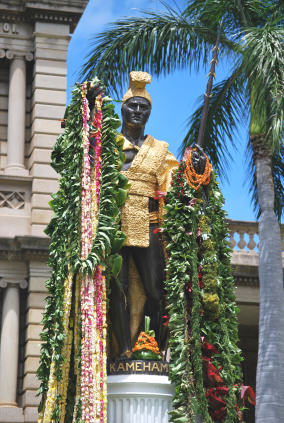There is so much wonderful art and architecture around Honolulu, it is hard to know where to start. Some of the best sights can be seen just by driving around in your car and keeping an eye out for historic buildings.
Here I will describe ten very historic Honolulu buildings that you can see when you visit Oahu. Seeing these historic buildings and learning a little about them is like taking a trip back in time to the olden days of Honolulu. There are many great vacation rentals and hotel deals on Oahu right now, so once you are settled in, take a drive around and check out some of these famous old buildings.
The first building on our historic tour is Washington Place, which was built in 1847 at 20 South Beretania Street in downtown Honolulu, right next to Iolani Palace.
This is a beautiful home that was constructed by John Dominis, the merchant sea captain who was the father of John Owen Dominis, the husband of Queen Liliuokalani.
Queen Liliuokalani lived in Washington Place until she passed away in 1917, and since then Washington Place has been renovated numerous times. The home continues to be used as a public reception area, and was recently the site of a reception for the Japanese Emperor!
Washington Place is on the National Register of Historic Places, and has also been declared a National Historic Landmark.
The impressive St. Andrew’s Cathedral was built in 1867 at Beretania and Queen Emma Streets (Queen Emma Square).
This Gothic style Honolulu cathedral came to be after King Kamehameha IV and Queen Emma raised $30,000 to begin construction. They had taken an interest in constructing an Anglican church after their visit to see England’s Queen Victoria in 1861 when they were quite impressed with the Church of England.
The French Gothic nave on St Andrews was made using a stone from England. A huge stained glass mural was installed across the front of the church in 1958 and represents the history of Christianity. St. Andrews is also on the National Register of Historic Places.
The Kamehameha V Post Office Building at Merchant and Bethel Streets was built in 1871 in the Renaissance Revival style. This historic structure is America’s oldest reinforced concrete building, and served as the Honolulu Post Office until 1922. Today it houses the State Foundation on Culture and the Arts.
The Moana Hotel is located in Waikiki and was Hawaii’s tallest building when it was constructed in 1901. With 75 rooms, this four-story building was the design of the prolific Hawaii architect Oliver Green Traphagen.
The Moana became known as the “First Lady of Waikiki,” and in 1901 another 100 rooms were added along with a seaside courtyard.
The 6-story Stangenwald Building at 119 Merchant Street was built in 1901 by renowned Hawaii architect Charles William Dickey (1871-1942).
Named after Honolulu physician Hugo Stangenwald, the building is notable for its many Italian Renaissance elements including a wrought-iron balustrade, pressed-copper trim, arched windows, terra cotta ornamentation, and Hawaii’s first electric elevator. For more than fifty years the Stangenwald Building was Hawaii’s tallest building.
The Stangenwald Building was built with a steel frame, using brick and concrete. The structure included built-in fire hoses as well as fireproof vaults on every other floor. Constructed in the wake of the 1900 Chinatown fire that displaced 4,000 Honolulu residents, the Stangenwald Building is considered Hawaii’s first fully fireproof building.
The Mission Memorial Building was constructed in 1915 at 558 South King Street. This white-trimmed, red-brick building was built by the Hawaiian Evangelical Association to mark the 100th anniversary of missionaries coming to Hawaii.
The style of the Mission Memorial Building is Colonial/Greek Revival, and this is the only example of true Georgian architecture in the Islands. This style was derived from British monarchy and was common in New England.
Today the building, which is on the National Register of Historic Places, is known as City Hall Annex and used for City and County Offices.
The United States Post Office, Custom House, and Federal Court House was constructed in 1922 at 335 Merchant Street.
Built in the Spanish Mission Revival style by New York architects York & Sawyer, the structure is known for its arched openings and tile roof. The building was renamed the King David Kalākaua Building in 2002 because the king was Honolulu’s postmaster from 1863 to 1865.
The structure is now used by the Department of Commerce and Consumer Affairs, and is listed on the National Register of Historic Places.
When Aloha Tower opened in 1926 on the waterfront at Honolulu Harbor it was Hawaii’s tallest building. Designed by architect Arthur Reynolds, Aloha Tower was considered Hawaii’s first “skyscraper,” standing 184 feet, 2 inches high with balconied openings and topped with a 40-foot flagstaff and a 7-ton clock. On each side of the tower the clock face says the word “Aloha.”
Honolulu Hale, Honolulu’s City Hall was built in 1927 at South King and Punchbowl Streets to provide offices for the mayor and city council. Designed by architects Charles William Dickey and Hart Wood, the building features pillars and arches, ceiling frescoes, decorative balconies, and a tiled roof.
Honolulu Hale is modeled after Italy’s Bargello Palace, which was built in Florence the 13th century. Inside the front door is a bell from the World War II ship U.S.S. Honolulu. Honolulu Hale was placed on the National Register of Historic Places in 1978.
Art exhibits are often shown in the spacious lobby of Honolulu Hale, and the center of the building features an open-air courtyard that sometimes hosts musical performances. Don’t forget to check out the grand double stairway at the rear of the courtyard, and the stairs that lead to a wraparound mezzanine.
An “Eternal Flame” burns in front of Honolulu Hale as a memorial in honor of the victims of the attack on the Twin Towers of the World Trade Center on September 11, 2001.
A inscribed plaque on the memorial states:
“Let this eternal flame unite our country in memory of those who lost their lives on September 11, 2001 and honor the brave men and women who put themselves in Harm’s Way to save others. The love and spirit of our grateful nation and the hearts and prayers of our people will always be with them. Dedicated on November 11, 2001 by the people of the City and County of Honolulu.”

